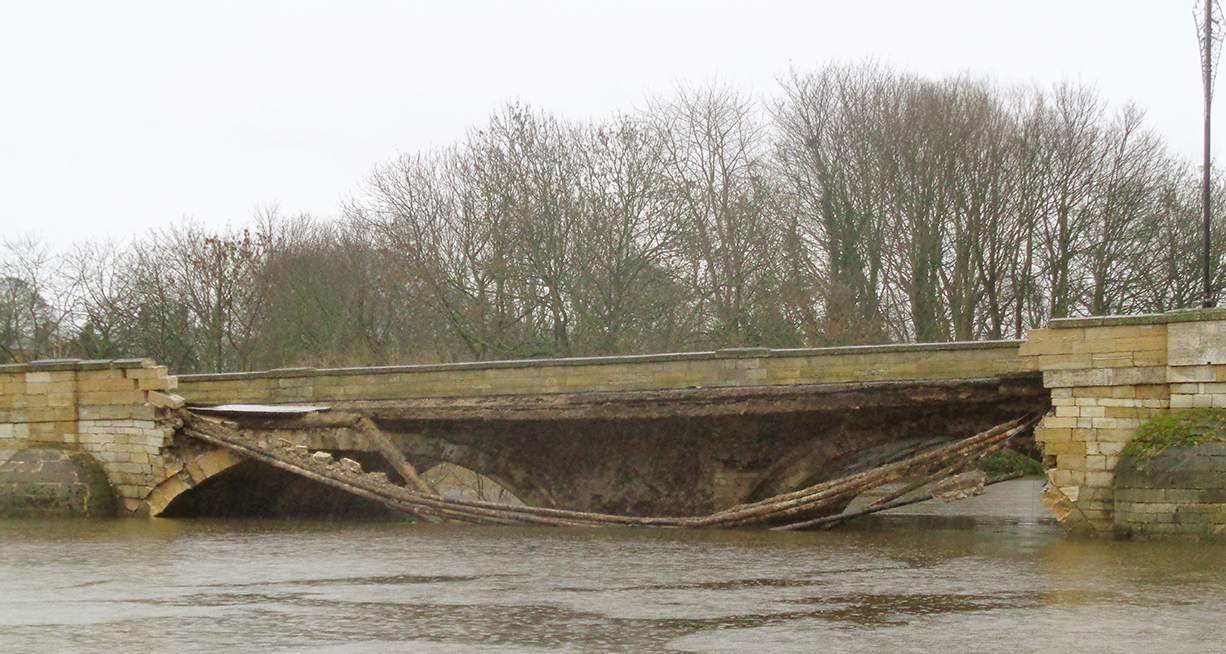
Partially collapsed Tadcaster Bridge seen from the Riverbank upstream from the river in Tadcaster, North Yorkshire. The bridge collapsed on December 29, 2015 following Storm Eva. (Photo: Wikimedia Commons)
It is a New Year, and time to acknowledge a new normal for the climate. 2015 was a year of records; ‘unseasonable’ weather brought natural disasters: flooding, landslides, tornadoes, earthquakes, forest fires, and drought.
Citizens around the world are coming to realise that this ‘new normal’ is one full of unpredictability in relation to weather patterns. El Nino is described by NOAA (National Oceanic and Atmospheric Administration) as, “a disruption of the ocean-atmosphere system in the Tropical Pacific having important consequences for weather and climate around the globe.” This phenomenon, characterized by unusually warm temperatures, has been in effect, and such warming increases moisture in the atmosphere.
In fact, each temperature degree increase brings about 7% more moisture into the atmosphere, increasing the potential for storms around the globe.
The UK is still recovering from three storms (Desmond, Eva, and Frank) that plagued Cumbria, Lancashire, Yorkshire and Scotland with massive flooding. According to the Met Office, December was the warmest month on record in the UK, and the wettest on record for Scotland and Wales. The recovery costs are already in the billions, and funds have been set aside to deal with the damage.
Prime Minister, David Cameron, called for a change in attitude from the Environment Agency regarding the disasters, focusing more on saving human lives and homes than on protecting the natural environment. Sir Philip Dilley, the agency’s head, resigned from his post after he vacationed to Barbados during the floods, a move that was met with widespread public condemnation. Though death tolls stayed relatively low, the recovery is expected to take months.
Cameron visited some of the affected areas to assess the damage; he suggested bringing engineers in to evaluate bridges, and ensured swift handling of insurance claims. Such disasters have shocked the nation, and caused many residents to be displaced.
Europe was not the only region hit with flooding; the US state of South Carolina was met with a “once-in-a-millennium” flood in October where eleven dams failed, seventeen people died, and over a hundred kilometres of a major highway were closed. Though the rainfall was described as “once-in-a-millennium,” due to the likelihood of such massive downpours occurring is 0.1% in a given year and place, it is the sixth such event in the US since 2010.
Chennai in India fell victim to major flooding during the Climate Change Conference in Paris (COP21), though the disaster went largely unnoticed, despite a significant death toll of over 300 people. This metropolitan hub of 4.8 million people was left battling risks of cholera, hepatitis, and malaria, as the world discussed its nation stepping up to do something about climate change.
Such disasters give merit to the idea that climate change disproportionately affects the poor, because there is often little infrastructure to deal with such massive destruction that leaves so many millions, who had little to start with, with even less.
Many people seem to have a hard time believing that climate change, in particular, brought on so many natural disasters last year, because it is hard to specifically quantify the correlation. In a society obsessed with number crunching and statistics, the inability to directly link warming with magnitude is being used as ammunition for sceptics. Meanwhile, farmers are having a harder time knowing when to plant and harvest, impoverished nations are unable to cope with drought and natural disasters, and coastlines are eroding.
The correlation is clear, and had been anticipated; one of the consequences of climate change is more extreme weather and natural disasters. El Nino has not helped either, but this new normal is something nations are going to have to prepare for, by setting aside funds, building higher and stronger levees and dams, investing in wetland and peat bog restoration to absorb some of the rising water levels, and educating residents in high risk areas on how to prepare for the worst.
Business as usual will not do; once a person has been the victim of a disaster and had his/her life turned upside down, there is no going back to the mindset before the tragedy. We, humans, must learn, must adapt, if we are to survive this transition.
Sarah Sakeena Marshall, B.S. Environmental Policy